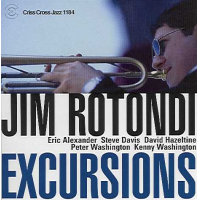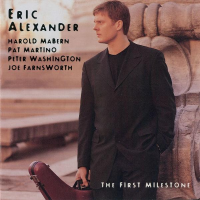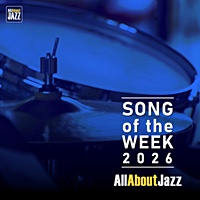Home » Jazz Articles » Eric Alexander
Jazz Articles about Eric Alexander
Eric Alexander: The First Milestone

by Jack Bowers
Eric Alexander, the most fearsome young lion of them all, even looks the part on his “official” debut recording for Milestone Records — pensive, unsmiling, saxophone case in hand, primed and ready for another day of jungle warfare whose chief purpose is not so much to vanquish his musical peers as to earn their respect, something the hard–working tenor has been accomplishing with relative ease since he placed second nearly a decade ago in the Thelonious Monk Institute’s saxophone competition. ...
Continue ReadingJim Rotondi: Excursions

by C. Andrew Hovan
One of the next major talents yet to be discovered by the jazz public at large, trumpeter Jim Rotondi is a dynamo full of the kind of bristling trumpet fire that distinguished such predecessors as Freddie Hubbard and Woody Shaw. Over the course of his first two Criss Cross dates, Introducing Jim Rotondi and Jim’s Bop Rotondi proved that he was a capable mainstream player with great promise in terms of developing his own voice. Now with Excursions he goes ...
Continue ReadingA Chat With Eric Alexander

by C. Andrew Hovan
One of the few “young lions" who is more influenced by Dexter Gordon and George Coleman than by John Coltrane and Sonny Rollins, tenor saxophonist Eric Alexander has come very far with his career in a short period of time. Following his first year of studying classical music at Indiana University as an alto player, Alexander picked up the tenor, made the switch to jazz, and the following year transferred to William Patterson College in New Jersey. In 1991 Alexander ...
Continue ReadingEric Alexander: The First Milestone

by C. Andrew Hovan
For all intents and purposes, you might like to think of Eric Alexander as being a modern-day equivalent of Tina Brooks, a very neglected tenor man from the ‘60s who just happened to be around when such mega stars as Johnny Griffin, John Coltrane, and Sonny Rollins also happened to be walking on the planet. Alexander certainly has his own competition to consider, with Joe Lovano and Chris Potter taking a lot of the attention these days in terms of ...
Continue ReadingJim Rotondi: Excursions

by David A. Orthmann
During the course of Excursions, his third disc as a leader for the Criss Cross imprint, Jim Rotondi continually finds ways of breathing new life into the straight-ahead, three horns and rhythm format. Rotondi has written and chosen a variety of tunes ranging from up and medium tempo swingers (“Angel Eyes,” “Shortcake,” “Little Karin”) to a bossa nova (“Excursions”), to ballads (“Little B’s Poem,” “What Is There To Say”). Further, he writes and utilizes arrangements by the band members that ...
Continue ReadingEric Alexander: The First Milestone

by David A. Orthmann
With the release of The First Milestone, Eric Alexander continues to make the transition from a young, hard-blowing tenor saxophonist to a mature soloist and leader of interesting small bands. Alexander is simply getting better at what he’s been doing quite well all along; that is, making high-energy music largely based on the spectrum of straight-ahead jazz of the 50s and 60s. Throughout the disc, his playing has its characteristic intensity, and his solos sound like complete statements rather than ...
Continue ReadingEric Alexander: The First Milestone

by Mark Corroto
Eric Alexander suffers from an ailment we’ll call Joe Lovano disease. Like his one time professor, Alexander so fluidly handles bebop patterns with relative ease that listeners dismiss his talent for casualness. His less-than-showman approach scores high with critics and fellow musicians but discovery by a wide audience requires style that has nothing to do with music. Perhaps we can come up with a nickname, that’s the ticket, a ‘gutbucket’ or ‘Red’ might be all he needs. Kidding aside, each ...
Continue Reading
















